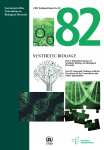The Secretariat of the Convention on Biological Diversity (CBD) has released a report that discusses the potential positive and negative impacts of synthetic biology on biodiversity, and assesses the adequacy of the Convention and other risk assessment and regulatory regimes to address these impacts.
 20 April 2015: The Secretariat of the Convention on Biological Diversity (CBD) has released a report that discusses the potential positive and negative impacts of synthetic biology on biodiversity, and assesses the adequacy of the Convention and other risk assessment and regulatory regimes to address these impacts.
20 April 2015: The Secretariat of the Convention on Biological Diversity (CBD) has released a report that discusses the potential positive and negative impacts of synthetic biology on biodiversity, and assesses the adequacy of the Convention and other risk assessment and regulatory regimes to address these impacts.
Published as ‘CBD Technical Series No. 82,’ the report on synthetic biology aims to support international debate, and bridge gaps between the science-policy interface, by providing technical information on the potential impacts on biodiversity that synthetic biology might entail. It also examines how adequately existing regulations cover the components, organisms and products of synthetic biology.
The document was developed on the basis of a literature review and information and views submitted by CBD Parties and other stakeholders. It covers a variety of cases: on the one hand, it shows that many of the applications of synthetic biology are aimed at developing more effective ways to respond to environmental and health challenges and could imply benefits for biodiversity conservation and sustainable use, including for instance, the development of microorganisms designed for bioremediation, and synthesizing products that are currently extracted from plant or animal sources. Negative impacts, on the other hand, include the transfer of genetic material from microbes produced through synthetic biology to other microorganisms with unforeseeable consequences, possible toxic and other negative effects on non-target organisms, and the transfer of genetic material to wild populations. The authors conclude that synthetic biology applications intended for environmental release will likely raise biosafety concerns, while, like other modern biotechnologies, synthetic biology raises ethical questions around the potential benefits weighted against the impacts from unintended consequences.
The report discusses a number of treaties that may provide mechanisms to address the potential negative impacts associated with synthetic biology techniques, including the CBD and its Cartagena Protocol on Biosafety. It suggests that, for the time being, existing biosafety risk assessment frameworks may be sufficient to assess the risks of current and near-term applications of synthetic biology to biodiversity. [CBD Press Release] [Publication: CBD Technical Series No. 82: Synthetic Biology]